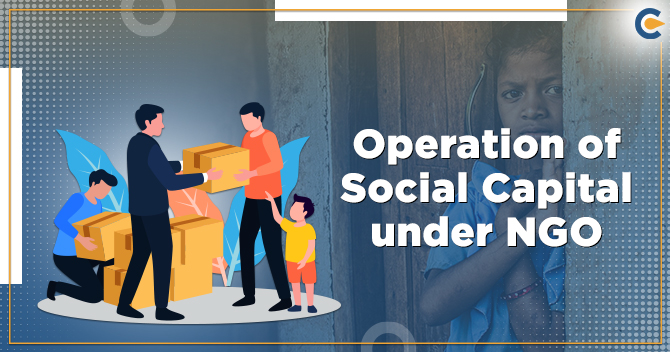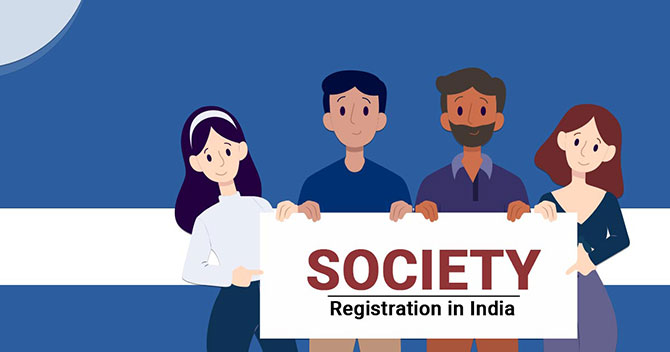Social capital basically allows a group of people to work together efficiently to accomplish a common principle & goal. It permits any society or an association like a corporation & an NGO, to function and work together as a whole while maintaining the trust with shared identity, rules, principles, and maintaining mutual relationships. In simple words, Social capital under NGO benefits society as a whole by developing social relationships between NGO and the concerned person.
The term social capital are into use recently, where the concept itself suggests that social relationships can have productive or useful outcome for any entity or group. The above said thing has been discovered for quite some time. Social Capital under NGO is commonly used to illustrate the civil as well as social responsibility & it also describes how members of an NGO work together to live peacefully as well as in harmony. The definition of Social Capital is purely social with no financial implications when used in the context of an NGO.
What is Social Capital under NGO?
A social capital perception includes virtually all forms of traditional culture which includes social groups like clans, village associations, tribes, religious sections, and similar units that are supported by rules, perspectives & behavior that shows cooperation. A modern society includes a large number of partly covered social groups that permit multiple memberships as well as identities. To use social capital for the benefit and use of any institutions, NGO Registration is mandatory.
Traditional societies like rural India have better access to social capital in small social units, but have less opportunity for multiple memberships, thus transferring information, innovation, and human resources are less resulting in a slower growth of the NGO.
How NGO Activities Affect Operation of Social Capital?
Activities that affect operation of social capital under NGO are demonstrated below-
Specific Goals for operation of Social Capital-


- The first aim is to study the NGOs policy for the development program for the poor. The development program can include developing social capital and institutions to support the lowest groups and the poor.
- The second aim is to investigate how the social capital under NGO has been linked to success or failure in reducing poverty in selected areas. An inspection of social capital in selected areas is to be conducted and the results are related to earlier efforts for collective actions of NGO.
Read our article:Guide on NGO Registration: Types and Benefits
Types of Social Capital
There are two types of Social Capital under NGO-


Structural social capital and cognitive social capital can be regarded as a type of capital that is basically used by NGOs because they need investment of time as well as efforts.
The above given concept of Social capital is less imprecise than many other definition of social capital. Yet it does not contradict the vibrant quality of the capital.
Development of Social Capital under NGO
Let us now investigate how social capital has to be developed and accumulate over time. If we consider social capital as an informal norm, that creates cooperation which is a clear-cut explanation of where the Social Capital comes from.
What is the role of NGOs concerning operation of Social Capital?
Role of NGOs in relation to social capital are as follows-
- Applying efforts to develop and allocate the social capital to ensure a 100% impact and reporting;
- Increase in the awareness among the social community;
- Enhance the flexibility for vulnerable poor citizens of the society;
- Conduct in-depth research for operation of Social Capital under NGO;
- Collecting the vital information regarding the use of social capital.
Impact of Social Capital under NGO on Economic Performance
The importance of social capital for economic performance is as follows-
It is often discussed that growth can be improved in countries where social or political institutions depress rent-seeking actions by increasing the level of social capital which lowers the transaction costs through contracts. It also shows that there is increase in trust between groups or individuals that encourages growth as well as production.
However, different societies have diverse cultural capacities for registering their NGOs. Decentralization in this case will create much reliable management structure that will affect the responsibility which in turn will increase the social capital level under NGO. This suggests that some reforms cannot be transformed to other societies lacking in social capital.
Determinants of Social Capital
Determinants of social capital are given below-
- It specifies that educational ability is associated with trust as well as political social arrangements;
- Apparently, Social capital is probably one of the intangible assets; that tends to be undervalued by markets because it is difficult to measure;
- Social capital is an essential means of production and development[1] because it reduces transaction costs related with coordination methods such as contracts, hierarchies and technical rules;
- It is also favorable in cooperation between individuals within home, companies, institutions or communities.
Social Capital Impact on Economic Performance – Levels
Social capital affects growth on many levels, but basically on these three levels:-


Macro level
If the nation faces high levels of institutional and political devolution then the advanced legal systems as well as a strong democratic regime will be operational. A lot of social capital is invested in the nation and it faced a strong macro economy in the country.
Sectoral level
Comparing the amount of social capital between various sectors, or investigating two identical firms within a sector, where the firm with copious social capital should outperform the other firm.
Community level
One or several other communities can be selected for inspection. A number of institutions within these communities are targeted to indicate whether the community is rich in social capital or not. Successful collective actions depends upon on how well the networks functions, whether social norms are consistent, level of participation among all sectors of the population & level of trust among the participants are consistent.
Therefore social capital can be well-known on macro, sectoral, and community levels and has ability to carry out combined actions and it is more often linked to the level of social capital under NGO.
Conclusion
Social Capital under NGO is occupied in development of the safety as well as human rights of any individuals. There is no difference between social capitals under NGOs because the operation of Social Capital is same for NGOs. Still, the goal is more or less identical to the objective of the NGO. Operation of social capital is done in the course of upliftment of the society.
Furthermore, society plays a major role in participation of NGO in social issues and help in finding solutions with respect to poverty and betterment of the lower group of the society. The work of the NGO is to create awareness among the concerned groups. Therefore NGOs have been a driving force for the country and acts as a managerial arm for the society.
Contact Corpbiz if you want to turn your social framework into a legal entity by opting for NGO Registration.
Read our article:How to approach NGO Registration in India? Forms & Features











